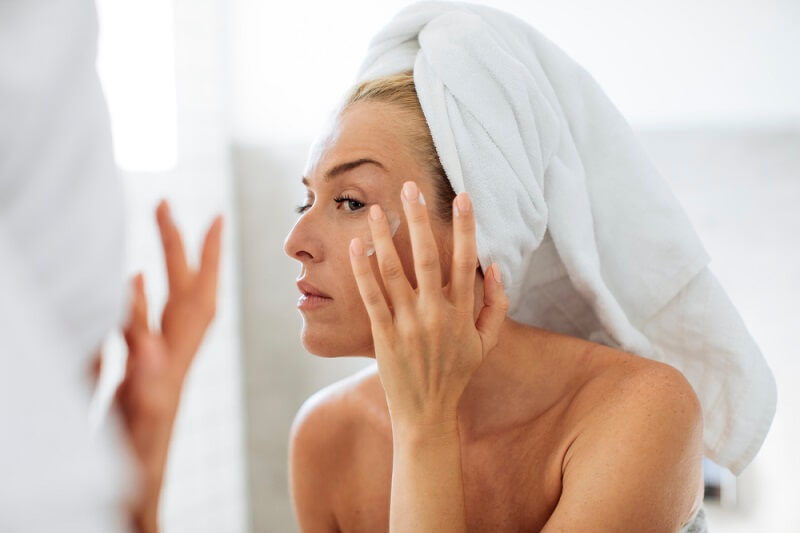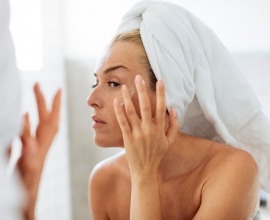Look for this Ingredient for Supple Skin
Whether you have been troubled by acne for years, recently undergone cosmetic surgery, or just noticed that dry skin has given you a number of deep wrinkles prematurely, these experiences might make you look at the fine print on your beauty products a little more closely. You definitely should, too! Particularly, dermatologists recognize the wonders hyaluronic acid does for the skin and researchers have started debating the benefits of its oral supplement. So, look closely at that fine print for this prized ingredient.

Hyaluronic acid acts like a sponge
Hydration, hydration, hydration. That’s what hyaluronic acid is most known for, which incidentally reduces fine lines and plumps up the skin. Apparently, this magic elixir earned its powerhouse prestige and reputation because it holds up to one thousand times its own weight in water. What is it exactly? Well, in simple terms, hyaluronic acid is a naturally produced sugar found within our body. The catch is, though, that this is something we produce on our own but only up until about the age of 20.[1]
A cool fact is that some dermatologists and cosmetic physicians even inject hyaluronic acid fillers to keep skin looking firm while reducing marionette lines or boosting the cheeks. Yet, if you use it only topically for at least eight weeks, you could see up to a 40% improvement in the depth of your wrinkles.[2]
Unique benefits from its topical application
At least within its topical application, there are a number of scientifically-backed benefits of including hyaluronic acid in beauty and medical treatments. Here are some of those notable advantages to using hyaluronic acid products and its clever application in medicine:
-
Its serums reduce wrinkles, redness and dermatitis.
-
It can help repair damaged skin locally, plus speed up recovery by regulating inflammation levels and aiding the body’s signals to build up blood vessels.
-
It reduces the size of wounds and their coinciding pain.
-
Its antibacterial properties reduce the risk of infection for open wounds.
-
Eye drops that contain between 0.2-0.4% hyaluronic acid improve eye health and reduce dry eye.
-
Hyaluronic acid-fortified contact lenses can alleviate dry eye symptoms.
-
Eye drops with hyaluronic acid are also frequently used during eye surgery.[3]
Beauty tips on how to use it effectively
An anti-aging beauty routine using hyaluronic acid works most optimally when you pair it with moisturizer or add a serum to lightly damp skin. Layering with moisture will keep your skin hydrated and limit the amount of makeup that collects in fine lines around the mouth and undereye regions. While tempting to use multiple products that include hyaluronic acid in their formulas, you’re going to want to restrict your use to only one step in your beauty routine. If you like serums, stick to just that serum and don’t add an HA formulated cleanser, toner or mask into the equation. Just as epic, life-style blogger Camille Styles puts it, a more the merrier mentality or misuse might lead to disappointing redness and inflammation.[4]
It’s all in the method, not liquid luck
In conclusion, remember that hyaluronic acid is a humectant and that it absorbs a ton of moisture, so you need to provide that moisture in order to prevent it from stealing your own from deep within the skin. Maintaining a youthful appearance doesn’t need to be complicated, so spend that extra time figuring out the tricks to using a few products at first before you try out the whole lot and accidentally cause yourself some discomfort. The great part about hyaluronic acid in particular is that you can simply get an extra boost with the world’s most plentiful resource, water.
Sources:
[1] Rud, Melanie. “10 Best Anti-Aging Ingredients, According to Dermatologists.” Real Simple, Meredith Corp, 5 June 2019, www.realsimple.com/beauty-fashion/skincare/anti-aging-ingredients-skinca...
[2] Laderer, Ashley. “The Best Anti-Aging Ingredients for Skincare, According to Dermatologists.” Insider, Insider Inc, 17 Sept. 2020, www.insider.com/the-best-anti-aging-ingredients.
[3] Julson, Erica. “7 Surprising Benefits of Hyaluronic Acid.” Healthline, Healthline Media, 21 Apr. 2018, www.healthline.com/nutrition/hyaluronic-acid-benefits#TOC_TITLE_HDR_6.
[4] Styles, Camille. “The Right and Wrong Way to Use Hyaluronic Acid.” Camille Styles, Camille Styles Inc, 3 Sept. 2020, camillestyles.com/style/the-right-and-wrong-way-to-use-hyaluronic-acid/.












